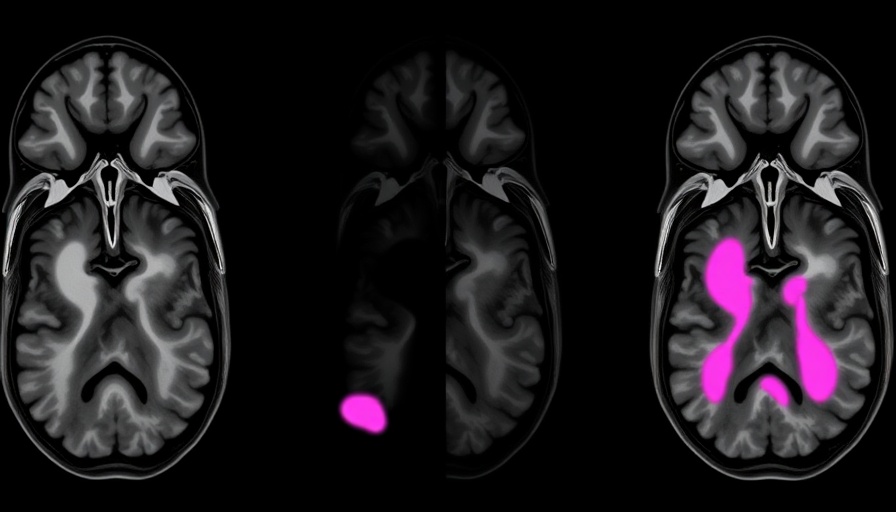
The Hidden Threat: Understanding Visceral Fat
While many focus on maintaining a healthy weight through diet and exercise, it's essential to recognize that not all fat is created equal. Recent research shows that visceral fat, the hidden fat surrounding our organs, poses unique risks, especially concerning heart health. This fat type is notorious for its stealthy presence; even in individuals deemed healthy by conventional metrics, the amount of visceral fat can be alarmingly high. Unlike subcutaneous fat, which is located under the skin and visible, visceral fat is deep within the abdomen, surrounding critical organs like the liver and intestines, making it harder to measure with the naked eye.
The Link Between Visceral Fat and Heart Aging
A groundbreaking study involving over 21,000 participants from the UK Biobank has linked visceral fat to accelerated heart aging. Conducted by researchers at the Medical Research Council in London, this study analyzed data to map fat distribution in the body and its correlation with heart health. Using advanced imaging technology and artificial intelligence, scientists discovered that excessive visceral fat contributes to inflammation and stiffness in heart tissues—a clear sign of aging.
Age Matters: How We Age Differently
Understanding how visceral fat influences heart health reveals notable gender differences. In the study, researchers highlighted that men with 'apple-shaped' bodies—where fat is prominently carried around the stomach—were more susceptible to faster heart aging compared to women. In contrast, fat storage in hips and thighs—a telltale sign of a 'pear-shaped' body—appeared to protect women from these adverse effects. This insight shifts the conversation from merely maintaining a healthy weight to understanding the types and locations of fat in our bodies.
Tracking Heart Age: A New Metric for Health
Another pivotal element emerging from this research is the concept of 'heart age.' By comparing an individual's actual age with the health status of their heart, doctors can gain a more nuanced understanding of a person's cardiovascular health. For example, a person aged 30 with excessive visceral fat could have a heart age of 40, signaling immediate action is needed to mitigate risks. This approach could empower individuals to take charge of their heart health rather than relying solely on weight as an indicator.
Impact of Hormones on Heart Aging
The relationship between hormones, fat storage, and heart health is continually unfolding. Interestingly, the study found that higher estrogen levels in premenopausal women may slow down heart aging, suggesting hormonal balance plays a critical role. This discovery opens avenues for further research into how sex hormones could be used therapeutically to combat heart disease.
Practical Steps for Managing Visceral Fat
Combatting visceral fat isn't merely about shedding pounds; it involves adopting specific lifestyle changes. Here are actionable insights:
- Regular Exercise: Aim for a combination of aerobic exercises and strength training. Cardio helps reduce fat overall, while strength training builds muscle, which can increase metabolic rate.
- Healthy Eating: A diet rich in whole foods such as fruits, vegetables, whole grains, and lean proteins can be effective in managing body fat levels.
- Stress Management: High-stress levels can lead to weight gain around the abdomen due to increased cortisol production. Techniques like yoga or mindfulness may help mitigate this.
The Bigger Picture: Lifestyle and Community in Dallas
For those living in Dallas and navigating its lifestyle dynamics, maintaining heart health while dealing with the city’s unique challenges is vital. Factors such as cost of living, accessibility to fitness options, and community health resources play significant roles in how residents can manage their health. Exploring local lifestyle management clinics and engaging with fitness communities in Dallas can provide necessary support and information.
Summing It Up: Awareness is Key
As research continues to unveil the intricacies of visceral fat and its impact on heart health, awareness is the first step toward prevention. Understanding that our bodies can harbor hidden dangers, even when they appear healthy on the surface, is crucial. By being informed and proactive, we can take steps not only to improve our heart health but also to enhance our overall well-being.
Take charge of your heart health today: consider getting your body composition analyzed to identify hidden fat. Pair this knowledge with lifestyle adjustments and community engagement to foster a healthier future.
 Add Element
Add Element  Add Row
Add Row 



Write A Comment